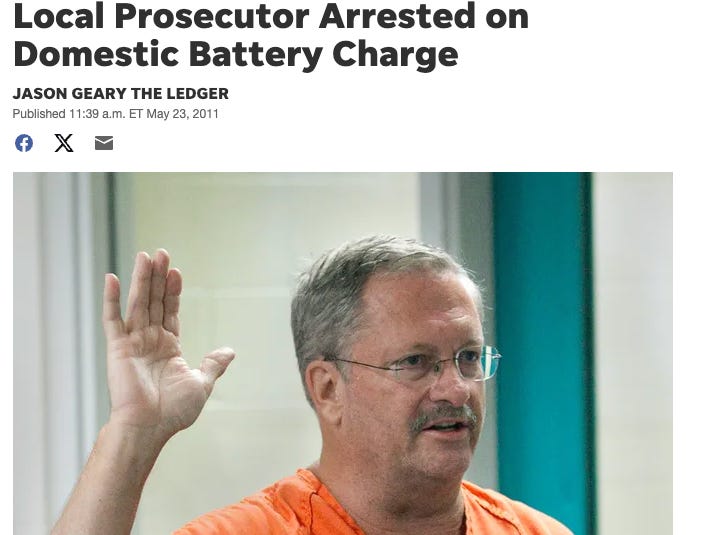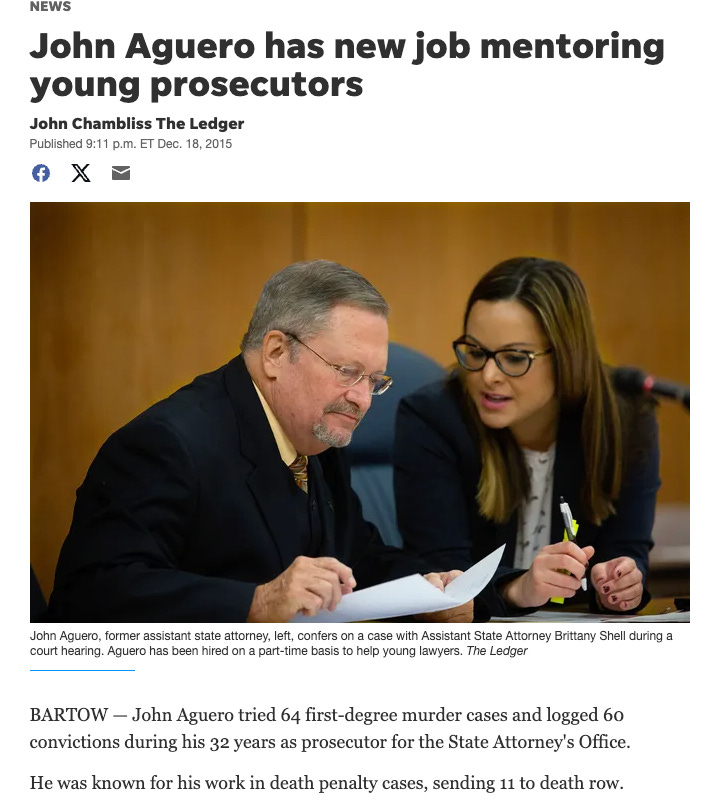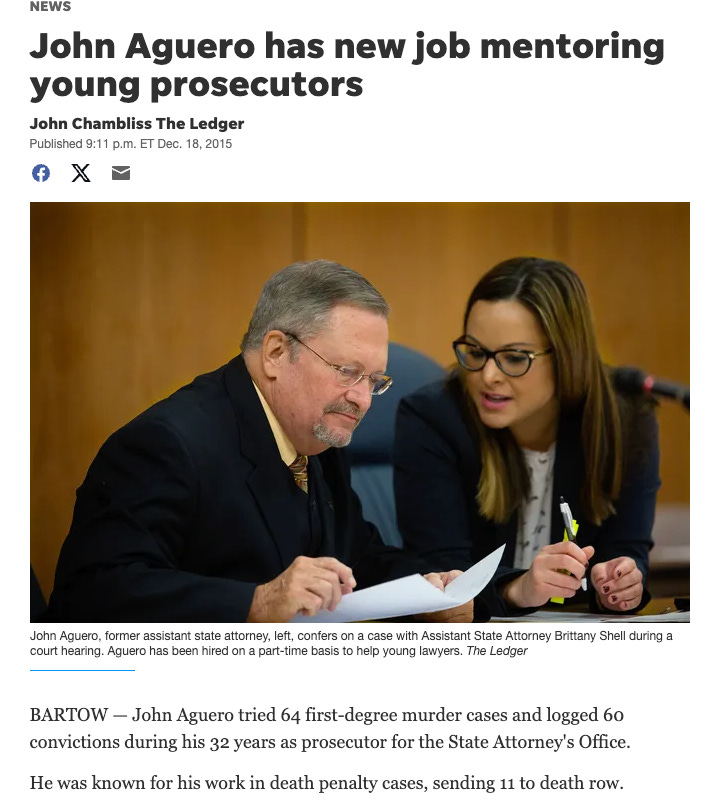Leo Schofield finally gets an honest trial; and "the Prosecutors" find him NOT GUILTY
How long will the 10th Judicial Circuit persist in its collective professional failure and moral cowardice? When will it drop charges and/or submit the case to an independent integrity review?
No one in the world — not Bone Valley’s Gilbert King, not Ledger reporter Suzie Schottelkotte, not Billy Townsend, not the entire, self-protective assemblage of lawyers and judges of Florida’s 10th Judicial Circuit — has done what Alice Shih LaCour and Brett Talley have now done with the Leo Schofield case.
In nine exhaustive episodes (including a two-part finale), they have tried Leo Schofield, in public, with deep consideration of all the available evidence accumulated in the 37 years since the 1987 killing of Michelle Schofield. No jury has ever gotten to hear anything like this before.
A clear acquittal
Brett Talley and Alice Shih LaCour — more than anyone else in the world, except maybe former prosecutor-and-judge Scott Cupp, who is now Leo’s lawyer — are the experts on the guilt or innocence of Leo Schofield.
They are both active or former prosecutors — politically and legally conservative — who want to believe in prosecutors and police. They are skeptical of criminal defendants, disdainful of suggestions that other high profile defendants — Adnan Syad or Scott Peterson, for instance — might not be guilty.
But the state of Florida’s case against Leo Schofield isn’t like those cases. And they have a clear verdict based on the evidence that no jurors have ever gotten to hear:
I do think Jeremy Scott did it. — Alice Shih LaCour
I think Jeremy Scott is essentially telling the truth. I think that night Michelle stopped at the pay phone. She made the phone call. Jeremy Scott saw her. She offered him a ride. He took it. He directed her to that canal with the intention of raping her. That was what he was going to do. I think he pulled out the knife and I think she fought back. I think she tried to drive away. He slammed the car into park. She stumbled out of the car. He went after her out of the car and he killed right there in the dirt stabbing her to death. The combination of because she resisted him, she refused him, she may have slapped him, she fought back — whatever his reasons — he was a violent person who did violent things; and he did it at the drop of a hat. He beat a man to death with a bottle; he choked him with a cord. He shot another man. He strangled another woman. He was a violent person and he killed violently. And I think in that moment, that is what he decided to do. — Brett Talley.
What you have to believe to believe Leo Schofield is guilty of murder
I would particularly urge any listeners who think Leo might still be guilty to listen to Alice LaCour concisely summarize what that belief requires of you. Listen to the sequence of events that must be true for Leo to be guilty in the scenario prosecutor John Aguero laid out in front of a jury in 1989.
It starts at about 3:00 into this final episode. It’s best heard in its entirety.
The Prosecutors also blame Leo, to some extent, for setting the conditions of his own conviction.
If you've listened to the most recent episode of Bone Valley, you know that Leo himself actively agrees with this. He described taking a “moral inventory” of his life during his recent time at a pre-parole prison program. Leo said a similar thing to me in an email exchange we had about a year ago.
I am sorry for the bad acts of stupidity I did commit while blessed to be with Michelle. Being young and immature is no excuse for bad behavior. That sentiment has haunted me for over three decades and no one can punish me more over it than I have myself. I wish I could take every bad moment back. But there were tons more of the good moments that NEVER received the attention that the very few bad moments did. And no one should be defined by their worst moments.
The level of Leo’s violence toward Michelle remains disputed — on a continuum from a few slaps (which Leo admits to) to much more brutal actions multiple witnesses testified to. But that violence certainly existed in some form.
And The Prosecutors point out, very sadly, that young Michelle, still a teenager, found herself surrounded and subject to violence right up to and including her death. It is, ultimately, justice for a brutalized young woman who never got to mature in her own right, that is paramount in this case.
Violence and guilt
I don’t know the extent of Leo’s violence against Michelle. But I don’t trust — at all — the accuracy or honesty of anything prosecutor John Aguero brought to the trial. I tend toward the lower end of the violence continuum. But I could be very wrong.
Only Leo knows for certain. And who knows how memory and guilt and prison affect even that certainty? But whatever one thinks of Leo’s moral guilt, 35 ongoing years in prison seems more than enough punishment for even the worst possible reality of violence against Michelle.
John Aguero never got anything like 35 years that for doing exactly what he accused Leo of doing as a husband. And no one except me — not even “the Prosecutors” — seems willing to reckon with how John Aguero’s personal violence against his wife relates to his corner-obliterating ferocity in prosecuting Leo — and others.
That connection is reserved only for Leo. And unlike Leo, the powers-that-be excused and/or ignored Aguero’s violence against women — both in this case and in his role at the SAO after his arrest.
The wrong class of person
Note the date on this — 2015, just four years after his domestic violence arrest.
Leo is blamed for his own wrongful conviction. John Aguero gets to go right on mentoring young women in nicely pressed suits. The violence toward women and wives question in this case is saturated by class, in my opinion.
John Aguero was of one class; Leo and Michelle, living day-to-day, phoneless, under the combustible pressures of having nothing, belonged to a very different class. The convictable vibes in 1987 were about much more than actual violence. They were about who is socially respectable and who isn’t. That’s also why celebrated defense lawyer Jack Edmund treated Leo with almost as much contempt — expressed by aggressive indifference — as Aguero did.
Look at this again, Schofield guilt dead-enders.
That headline and picture tells you soooo much about Jerry Hill, Aguero’s respectable longtime boss. It says much about the respectable moral and legal values of the 10th Judicial Circuit, which are demonstrably not respectable at all.
“I think that’s exactly what happened here.”
Still, all that said, I think this, from Brett Talley, is largely (though not entirely, if you study American racial history) correct and vital. I think it’s definitely correct in the Schofield case, especially when you account for class presentation:
It is important, I think, to recognize the role that, sort of, Leo played in this not to cast aspersions on him and criticize him or try and forgive the state for what it did. But because it’s this kind of situation that tends to lead to false convictions. I don’t think your average false conviction is actually just some completely innocent person who never did anything wrong who is grabbed up by police who decide they are going to frame his person for murder.
I think, in reality, when you see false convictions, a lot of the time its the police, prosecutors, tunnel vision, focusing on somebody because of something else they’ve done or some reputation they have, and then building the case and ignoring the problems because of it. And I think that’s exactly what happened here.
Now, when will someone, anyone, connected with state’s case finally summon the courage and decency to openly express doubt about this case so we can finally end Leo Schofield’s 35-year prison sentence for being a poor, head-banging asshole in 1987.







